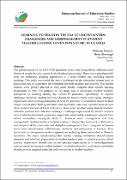| dc.contributor.author | Omara, Polycarp | |
| dc.contributor.author | Akwongo, Betty | |
| dc.date.accessioned | 2022-04-11T09:08:13Z | |
| dc.date.available | 2022-04-11T09:08:13Z | |
| dc.date.issued | 2022-04 | |
| dc.identifier.citation | Omara, P., & Akwongo, B. (2022). Learning to teach in the era of uncertainties: challenges and lessons learnt by student teachers during Covid-19 pandemic in Uganda. European Journal of Education Studies, 9(4). | en_US |
| dc.identifier.issn | 2501 - 1111 | |
| dc.identifier.uri | http://dir.muni.ac.ug/xmlui/handle/20.500.12260/451 | |
| dc.description.abstract | The global impact of the COVID-19 pandemic is not only being felt by different social classes of people, but also across levels of education systems. There was a paradigm shift from the traditional teaching approaches to a more flexible one, including remote teaching. This crisis uncovered the many challenges in the education system such as access and lack of supportive environments for both teachers and learners. The teacher trainees were greatly affected as they could hardly complete their teacher training programme in time. The purpose of this study was to investigate student teachers’ perception of teaching during the COVID-19 pandemic. Specifically, to explore challenges faced by student teachers; document lessons learnt and coping strategies improvised while teaching during the COVID-19 pandemic. A concurrent mixed method design was adopted. Both quantitative and qualitative data were collected from 46-year three student teachers of Muni University. Data were collected using student teachers’ reflective journals and reflective meetings. Challenges experienced by student teachers were related to placement, supervisor-supervisee relationship, inadequate support from school authorities, inadequate skills in classroom room management and time management. Student teachers adopted coping strategies like teamwork, collaborative and adaptive skills, classroom and discipline management. Four categories of lessons learnt were adaptiveness, collaboration, creativity and uniqueness of learners. They learnt how to incorporate modern approaches including those embedded in Bloom’s taxonomy. The study recommended that teacher training institutions should ensure adequate and wholistic preparation of student teachers prior to school practice; school practice supervisors should treat school practice supervision as a non-judgemental exercise meant to enhance student teachers’ professional growth, and school authorities should provide required materials and mentorship to student teachers. | en_US |
| dc.publisher | European Journal of Education Studies | en_US |
| dc.subject | School practice | en_US |
| dc.subject | Coronavirus disease | en_US |
| dc.subject | Bloom’s taxonomy | en_US |
| dc.subject | Reflective journal | en_US |
| dc.subject | Initial teacher education | en_US |
| dc.title | Learning to teach in the era of uncertainties: challenges and lessons learnt by student teachers during Covid-19 pandemic in Uganda | en_US |

